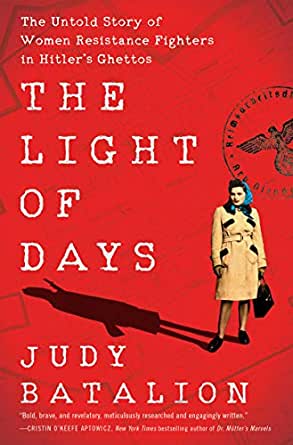The Light of Days
Full Title: The Light of Days: The Untold Story of Women Resistance Fighters in Hitler's Ghettos
Author / Editor: Judy Batalion
Publisher: William Morrow, 2021
Review © Metapsychology Vol. 25, No. 21
Reviewer: Bob Lane
“In the 1940s, a group of young Jewish women living in the ghettos of Poland reacted to Adolf Hitler’s murderous campaign with unfathomable courage.”
And, indeed, the courage exhibited in the acts of these remarkable women is not only amazing, but also required an amazing amount of research to dig it out of the ““The primary source material for this project comprised mainly memoirs and testimonies. Some were written – in Hebrew, Yiddish, English, Polish, Russian, German. Some were translated, some were translations of translations, some I (Judy Batalion) translated myself.” (p. 452) And the result is a most readable bit of important history, well documented (100 pages of notes), and well told. The book, over 500 pages in length, tells the story of women resistance fighters who smuggled weapons, assassinated Nazis, and sabotaged German supply lines. The book focuses on resistance inside the ghettos where many Jews were sent before Nazi death camps in the early stages of the WW2.
Reading current affairs in our shared world today reminds me that everyone should read this book to be reminded of the courage, the evil, the disaster, of war. We need to listen and learn from the past in order that we do not repeat the evils of those times – because we have forgotten the stories and the acts of those times not so long ago. The women and girls who are at the centre of the action in the book responded to the occupying Nazis in many ways: ” They hid revolvers in teddy bears and dynamite in their underwear. They learned how to make lethal Molotov cocktails and fling them at German supply trains. The girls with “Aryan” features who could pass as non-Jews flirted with Nazis – plying them with wine, whiskey and pastry before shooting them dead.”
“They disguised themselves as non-Jews and traveled between locked ghettos and towns, smuggling people, cash, documents information, and weapons, many of which they had obtained themselves.” (p. 5)
As Batalion points out ““Needless to say, Jewish resistance to the Nazis was not a radical woman-only feminist mission. Men were fighters, leaders, and battle commanders. . . . As described by fighters Chaika Grossman, “The Jewish girls were the nerve-centers of the movement.”
“There are many reasons the stories of Jewish women in the resistance went underground. The majority of the fighters and couriers were killed-Tosia, Frumka, Hantze, Rivka, Leah, Lonka – and did not live to tell their tales. But even for survivors, female narratives were silenced for both political and personal reasons, which differed across countries and communities.” (p. 402)
A moving story, told by a talented writer, and bound to remind the reader of a dark time in our world history, the book should be required reading in many university courses as the years between the big war and today grow and grow. One hopes that it is not only the old, like this reviewer, who remember that time in our history, and try to learn from it. So many died, so many were confused and confounded by the Nazis, so many seem to have forgotten the terrors of that and other wars; the evil, the stupidity of war. And, of course, the bravery of those who fought.
The stories are moving and heart-breaking at times. She tells the stories in such a way as to put the reader directly in the narrative, to put you there at that time: feeling the danger, the pain, the horror of the time – while at the same time accurate and fact based.
Batalion’s approach is not feminist propaganda, but a well-researched document intended to remind us of the past and of the heroines who fought so bravely against the Nazis. Well researched, well written, a must read for all.
Bob Lane is a USMC Korean Veteran.
Categories: General
Keywords: World War 2, history

